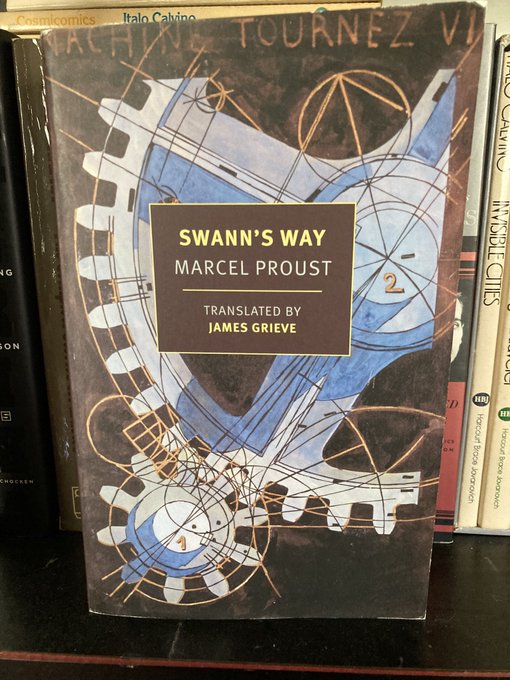
This May, NYRB will publish a “new” translation of the first volume of Marcel Proust’s longassed novel In Search of Lost Time.
The translation, by James Grieve, is not actually new. It’s actually like half a century old.
The NYRB jacket copy states that “James Grieve began his career as a translator of Proust in the early 1970s, driven by his dismay at how many readers deemed In Search of Lost Time to be too difficult for them to take on. Grieve’s artful and celebrated version of Swann’s Way—only now available outside his native Australia—shows that this is hardly the case.”
I was unfamiliar with Grieve’s translation. As I admitted on Twitter, I’m not really a Proust Guy. I read Lydia Davis’s translation of Swann’s Way a decade ago, and thought it was Okay and decided it was also Enough. Many, many people replied to my tweet that C.K. Scott Moncrieff’s translation was the way to go. Author and translator Daniel Mendelsohn told me that I’d “read the wrong translation!” — but I’m okay with that.
Here is the I-guess famous opening line of Moncrieff’s 1922 translation:
For a long time I used to go to bed early.
Here is the Modern Library’s 1992 translation, crediting Moncrieff and Terence Kilmartin, revised by D.J. Enright:
For a long time I would go to bed early.
Here is Lydia Davis’s translation (2002) of the opening line:
For a long time, I went to bed early.
And here is James Grieve’s translation:
Time was when I always went to bed early.
There were a lot of opinions on Grieve’s rendering of this particular line floating around Twitter.
I have no dog in this race, but the voicing here strikes me as, I dunno, very, uh, colloquial? Almost like Huck Finn or something?
Proust’s original, by the way:
Longtemps, je me suis couché de bonne heure.
I muddled my way through a few years of college French, and have no real strong opinions here, but the phrase bonne heure is the most interesting to me. When I read it in French, I read it as something like, “a good hour,” or “the right time.”
Translation is about feeling and tone and vibe and mood as much it is about (the attempt for) precision, so I suppose each translator brings their own sense of the narrator’s voice to their translation, a voice that may or may not sync with what those other translators, the readers, hear in their mind’s ear.

Swann isn’t the narrator.
But yes: “Time was” has the sound of a translator being more focused on solving inessential puzzles (in this case, getting “time” to be the first word) than on getting the tone right.
LikeLike
“Time was I went to bed at a good hour,” sounds pretty good to me.
LikeLike
Yeah, that’s a pretty striking first line in Grieve’s translation. Interesting post as ever.
LikeLike
Being a “Proust Guy” through and through, I say that indeed you read the wrong translation. The crude, dumbed-down, down-home folksy tone is nauseating. Nothing will ever better Scott Moncrieff’s.
LikeLike
“de bonne heure” simply means “early” . The phrase is a synonym of “tôt”
“At the right time” is “Au bon moment”
“à la bonne heure !” means ” about time !”
Jean-Paul, French translator
LikeLike